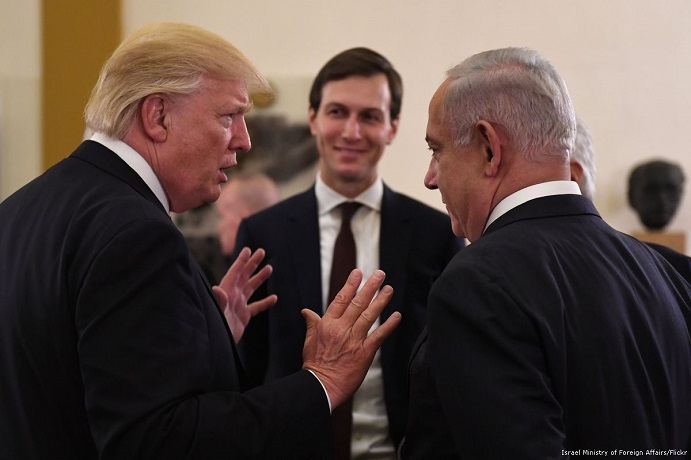Middle East Monitor / June 24, 2020
Senior aides to US President Donald Trump began discussions on Tuesday on whether to give Israeli Prime Minister Benjamin Netanyahu a green light for his plan to annex settlements in the occupied West Bank, according to a US official and a person familiar with the deliberations.
With Netanyahu’s July 1 target date approaching, the White House meeting included Trump’s son-in-law and senior adviser Jared Kushner, national security adviser Robert O’Brien, Middle East envoy Avi Berkowitz and the US ambassador to Israel David Friedman, the US official said.
Trump, whose support Netanyahu is counting on for a move that has drawn condemnation from the Palestinians and US Arab allies, did not participate, the official said, speaking on condition of anonymity. But US sources have said he could join in later as this week’s deliberations continue.
Under Trump’s Middle East peace proposal unveiled in January, it is envisaged that the United States would recognize the Jewish settlements – built on land the Palestinians seek for a state – as part of Israel.
Trump’s proposal would eventually create a Palestinian state under a broader peace plan but impose strict conditions on it. Palestinian leaders have completely rejected the initiative.
Encouraged by Trump’s push, Netanyahu intends to launch his project of extending sovereignty over the settlements and the Jordan Valley, hoping for US approval. Most countries view Israel’s settlements as illegal, and Palestinian leaders have voiced outrage at the prospect of annexation.
Among the main options under US consideration is a step-by-step process in which Israel would initially declare sovereignty over several settlements close to Jerusalem instead of the 30% of the West Bank envisaged in Netanyahu’s original plan, according to a person close to the matter.
Trump has not closed the door to a larger annexation, but fears that allowing Israel to move too fast could kill any hopes of drawing the Palestinians into talks on Trump’s plan, the source said.
There are also concerns about opposition from Jordan, one of only two countries that have a peace treaty with Israel, and from Gulf states that have quietly expanded engagement with Israel.
The officials on Tuesday held what one source called “informal internal discussions.” No decisions were reached at the meeting, which Kushner attended before leaving with Trump on a trip to Arizona, the US official said.
Washington has also made clear it wants Israel’s unity government, divided on the issue, to reach a consensus.













